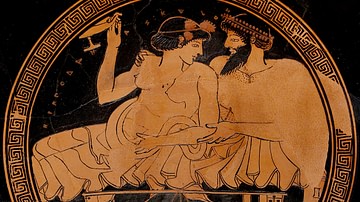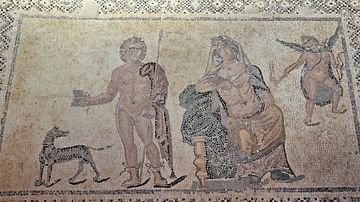Search
Search Results

Definition
Tympanon
The tympanon (tympanum in Latin) was the most popular frame-drum in ancient Greek music, producing a loud rumbling sound not far from the sound of the orchestral timpani drums today. This percussion instrument was played mainly by women on...

Article
Prostitution in Ancient Athens
Prostitution in ancient Athens was legal and regulated by the state. During the Greek Archaic Period (c. 800-479 BCE) brothels were instituted and taxed by the lawgiver Solon (l. c. 630 - c. 560 BCE), and this policy continued into the Classical...

Article
Ten Noble and Notorious Women of Ancient Greece
Women in ancient Greece, outside of Sparta, had almost no rights and no political or legal power. Even so, some women broke through the social and cultural restrictions to make their mark on history. All of the women did so at great personal...

Article
A Visitor's Guide to Pompeii
Visitors to Naples and its surrounding area could be overwhelmed by the number of archaeological wonders to see. Buried for centuries beneath tons of volcanic ash and debris, the archaeological sites scattered along the coast of Naples are...

Definition
Ancient Greece
Greece is a country in southeastern Europe, known in Greek as Hellas or Ellada, and consisting of a mainland and an archipelago of islands. Ancient Greece is the birthplace of Western philosophy (Socrates, Plato, and Aristotle), literature...

Definition
Hadrian
Hadrian (l. 78-138 CE) was emperor of Rome (r. 117-138 CE) and is recognized as the third of the Five Good Emperors (Nerva, Trajan, Hadrian, Antoninus Pius, and Marcus Aurelius) who ruled justly. His reign marked the height of the Roman Empire...

Definition
Hellenic World
The Hellenic World' is a term which refers to that period of ancient Greek history between 507 BCE (the date of the first democracy in Athens) and 323 BCE (the death of Alexander the Great). This period is also referred to as the age of...

Definition
Agora
The term agora (pronounced ah-go-RAH) is Greek for 'open place of assembly' and, early in the history of Greece, designated the area in a city where free-born citizens could gather to hear civic announcements, muster for military campaigns...

Definition
Aeschylus
Aeschylus (c. 525 - c. 456 BCE) was one of the great writers of Greek Tragedy in 5th century BCE Classical Athens. Known as 'the father of tragedy', the playwright wrote up to 90 plays, winning with half of them at the great Athenian festivals...

Definition
Phaedra
Phaedra is a princess of Crete and the wife of the Greek hero Theseus in Greek mythology. She is one of the main characters in Euripides' (c. 484-407 BCE) Greek tragedy Hippolytus, which recounts how her love for Thesesus' son Hippolytus...